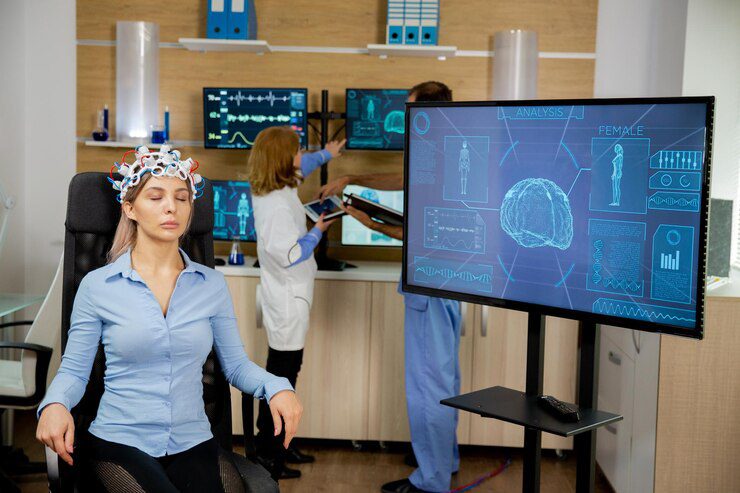Artificial Intelligence (AI) has emerged as a transformative force in the healthcare industry, reshaping the landscape of patient care and medical practices. From diagnosis to treatment, AI applications are revolutionizing the way healthcare professionals operate, enhancing efficiency, accuracy, and accessibility. In this exploration of AI in healthcare, we delve into the myriad ways this technology is advancing patient care.
Early Disease Detection
AI has proven to be a game-changer in early disease detection. Machine learning algorithms can analyze vast amounts of patient data, from medical records to diagnostic images, to identify subtle patterns and indicators of diseases at their nascent stages. This early detection not only improves treatment outcomes but also enables proactive measures to prevent the progression of illnesses.
Diagnostic Imaging and Radiology
In diagnostic imaging, AI algorithms have demonstrated remarkable capabilities in the medical diagnosis of images with precision. From identifying anomalies in X-rays and CT scans to detecting early signs of conditions such as cancer, AI enhances the diagnostic process. Radiologists can leverage AI tools to expedite analysis, leading to quicker diagnoses and timely interventions.
Personalized Treatment Plans
AI in healthcare plays a pivotal role in tailoring treatment plans to individual patient profiles. By analyzing genetic data, treatment history, and other relevant factors, AI algorithms can recommend personalized therapies and medications. This level of customization not only increases treatment efficacy but also minimizes adverse effects, optimizing patient outcomes.
Virtual Health Assistants and Chatbots
The integration of virtual health assistants and chatbots powered by AI enhances patient engagement and accessibility to healthcare information. These tools provide instant responses to queries, offer health advice, and can even schedule appointments. By facilitating communication between patients and healthcare providers, AI-driven virtual assistants contribute to a more patient-centric healthcare experience.
Read More: Holistic Health: Nurturing Mind, Body, and Spirit
Predictive Analytics for Patient Outcomes
Predictive analytics, fueled by AI, enables healthcare professionals to forecast patient outcomes based on historical data. This proactive approach assists in identifying high-risk patients, allowing healthcare providers to intervene early, allocate resources efficiently, and tailor care plans to mitigate potential complications.
Remote Patient Monitoring
AI in healthcare facilitates remote patient monitoring through wearable devices and sensors. These technologies continuously collect and analyze patient data, providing real-time insights into health metrics. Healthcare providers can remotely monitor vital signs, detect anomalies, and intervene promptly, particularly for patients with chronic conditions, fostering a more proactive and personalized approach to care.
Drug Discovery and Development
The drug discovery process, historically a time-consuming and costly endeavor, is being accelerated by AI in healthcare. Machine learning algorithms analyze biological data to identify potential drug candidates and predict their efficacy. This expedites the drug development pipeline, reducing costs and shortening the time it takes for new treatments to reach patients.
Resource Optimization in Healthcare Facilities
AI-driven solutions contribute to resource optimization within healthcare facilities. Predictive analytics can forecast patient admission rates, enabling hospitals to allocate staff and resources efficiently. Additionally, AI helps streamline administrative processes, reducing paperwork and administrative burdens, and allowing healthcare professionals to focus more on patient care.
Cybersecurity and Data Protection
As healthcare becomes more digitized, ensuring the security of patient data is paramount. AI in healthcare assists in bolstering cybersecurity measures by detecting and preventing potential breaches. Machine learning algorithms can analyze patterns to identify unusual activities, protecting sensitive medical information from unauthorized access.
Ethical Considerations and Human Oversight
While AI brings numerous benefits to healthcare, ethical considerations must be addressed. Ensuring transparency in AI algorithms, safeguarding patient privacy, and maintaining a human-centric approach are crucial. Human oversight remains essential to interpret AI-generated insights, make informed decisions, and maintain the empathetic and ethical aspects of patient care.
Conclusion
The integration of AI in healthcare marks a paradigm shift in patient care and medical practices. From early disease detection to personalized treatment plans, AI enhances the efficiency, accuracy, and accessibility of healthcare services. As technology continues to evolve, striking a balance between innovation and ethical considerations remains paramount. The future of healthcare lies in the collaborative synergy between AI and healthcare professionals, working together to deliver more precise, personalized, and compassionate care to patients worldwide. The transformative power of AI is not just about revolutionizing technology; it’s about revolutionizing the very essence of healthcare.







